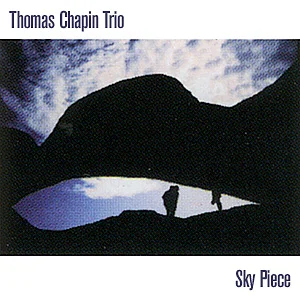Thomas Chapin's trio entered the studio for the final time six months later to record Sky Piece.
Three of the album's compositions had been performed four years earlier and are also included on Night Bird Song, and a comparison indicates that Chapin, Pavone and Sarin had grown more confident of their approach, without introducing any major alterations. "Alphaville" moves more rapidly, a roller coaster with deeper dips, or perhaps a master-level game of triple dare. What results is looser in its energy, yet even more focused in its details. "Changes 2 Tyres," commemorating a night when Pavone changed the wrong tire on his car, is more concentrated, like a monologue that has been polished in the retelling, and Sarin now takes the solo after Chapin's alto. "Night Bird Song" captures so much that was definitive about Chapin's music in its connection of diverse emotional states in a single performance, its responsiveness to nature (the piece was inspired by a bird he heard on a midnight walk) and amalgamation of memorable individual parts that reinforce each other in the collective statement. It was one of the trio's central pieces, and offers evidence of how the music had grown over time.
The rest of the album is just as impressive. There are two short, pungent collectively improvised pieces. The world of Thelonious Monk is revisited in "Ask Me Now," with its incredible display of circular breathing in the final alto sax cadenza; and the alto is put to slinkier, though equally hypnotic use on "Bypass," where the precision of each sound from the trio gives maximum impact to the dramatic resolution. "Just Now," where Chapin employs the pinkullo, a wooden flute, against the quiet ticking of a clock, recalls Chapin's love of the Japanese shakuhachi, while the track "Sky Piece" features the bass flute, with its warm, glowing sound. "Don't Mind If I Do" and "Essaouira," the first a gritty swinger highlighting the trio's sense of swing, the second meditation conceived during a trip to Morocco, are worth special attention, because they demonstrate irrefutably that Chapin was one of the finest jazz flute players of his time.
““...I really don’t know what I’m doing. I don’t want to know, because it’s a better area.””
In the same month that _Sky Piece_ was recorded, I had the rare pleasure of hearing Chapin at length. During the course of UmbriaJazz 1996, the trio had a 10-night stand at the subterranean Club Il Pozzo in Perugia, Italy, where it started blowing at midnight and regularly left its exhilarated listeners demanding more after three hours of astonishing music nightly. Chapin was deservedly proud of the response he was getting, and took it as a confirmation of his approach. "We're always rooted," he explained to me one afternoon, "and if you can begin with something that people relate to and then take them a little further, it's like show-and-tell. That's what I'm supposed to be doing." At the same time, he was eager to push forward. "It's hard, very hard to create music," he emphasized; "it's a clean slate every night. Yet somehow I'm here, playing in paradise. I've gotten into a very intuitive area, particularly with the trio, where I don't really know what I'm doing. I don't want to know, because it's a better area."
As he soon learned, there was very little time left for Chapin to continue his explorations. He fell ill during a return trip to Africa early in 1997 and was diagnosed with leukemia upon his return to New York. After struggling valiantly against the disease for a year, he finally succumbed in February 1998, 10 days after an emotional surprise appearance at a tribute concert in his home town. "Chapin never got the chance to play with his idol Roland Kirk," I wrote upon hearing of his passing, "but we can take some solace in our newfound definition of heaven as that place where the spirits of these irreplaceable jazz magicians are now communing."
We can also take solace in the music Chapin left us, including the previously unissued tracks that his widow Terri Castillo-Chapin and Mario Pavone have selected for inclusion in this collection's bonus CD. Like the rest of this music, they summon images of Chapin in action, cuing transitions with quick sideways glances and shoulder thrusts, cross-hatching ideas over the momentum generated by Pavone and Sarin or flowing through it to climactic resolutions, drumming his saxophone reed with his fingers while also blowing or removing the horn's neck and blowing directly into the body. Pavone is right with him, fretting the neck of the bass with as much intensity in his left hand as he employs in plucking tones with his right; and Sarin, in constant motion, is adding percussive parts in rainbow colors with the force or subtlty that the moment demands.
"My soul rises from a mournful Earth into a clarity above Time," Chapin wrote in the notes to the _Sky Piece_ album, after his illness had been diagnosed. "While Time is, it is best to be in both worlds, Music as the bridge." Music remains the bridge that sustains Chapin's spirit among those of us who are listening, the soundprint as light as breath and bold as a heartbeat.
- Bob Blumenthal, The Boston Globe, September 199
